U校园读写2 unit6答案
新视野大学英语(第三版)读写4 U校园答案
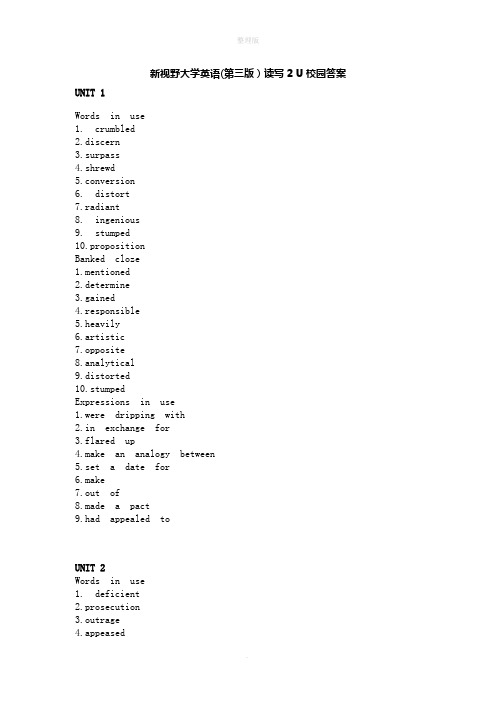
新视野大学英语(第三版)读写2 U校园答案UNIT 1Words in use1. crumbled2.discern3.surpass4.shrewd5.conversion6. distort7.radiant8. ingenious9. stumped10.propositionBanked cloze1.mentioned2.determine3.gained4.responsible5.heavily6.artistic7.opposite8.analytical9.distorted10.stumpedExpressions in use1.were dripping with2.in exchange for3.flared up4.make an analogy between5.set a date for6.make7.out of8.made a pact9.had appealed toUNIT 2Words in use1. deficient2.prosecution3.outrage4.appeased5.conformity6.strandplement 8.transient9. appliances10.outfitBanked cloze1.achieving2.gorgeous3.considered4.context5.accessories6.appreciatedplexion8.handsomement10. admirationExpressions in use1. in hopes of2. came up with3. excused herself4. was obsessed with5.reaching out to6.voice an opinion on7. live up to8.in terms ofUNIT 3Words in use1. exquisite2.dispersed3.decentralized/decentralised4.deduce5.fixture6. frugality7. administrate8. disjointed9. Reviving10.elapseBanked cloze1.frequently2. immersed3.disrupted4.stress5.sphere6.challenges7.quantify8.financial9.administrate10.addiction Expressions in use1.held2. in high regard3. In the interim4.was onto something5.in turn6.from time to time7. pick on8. take a stab at9.boil down toUNIT 4Words in use1.consolidate2.differentiate3.dreadful4.incompatible5. alleged6. bizarre7. correlation8.negligible9.habitats10.intelligible Banked cloze1.incompatible2.preserve3.available4.proportion5.utilized6.converted7.dreadful8.balance9.sane10.considerable Expressionsin use1.took on2.called upon3.runs against the grain4.be incompatible with5. come through6.is bound up7. differentiate between8. have struck a chord withUNIT 5Words in use 11.fabricate2.nominal3. temporal4.reciprocal5. denotes6. consecutive7. spectators8. muttering9. composite10.maliciousBanked cloze1.exterior2. insightsplete4.course5.inconsistencies6.offended7.gestures8.ornaments9.sense10.distinctiveExpressions in use1. got to the point2. are attached to3. would have starved to death4.If anything5.were suspicious of6.wandered around7.on the side8.was representative ofUNIT 6Words in use1. alien2. optic3.symmetrical4.lubricated5. twinkled /were twinkling6.mediator7. outposts8.traversing9.emancipate10.deductiveBanked cloze1.reason2.levy3.generating4.lightweight5.reduction6.enhance7.achieved8. emancipate9. relationships10.approachesExpressions in use1. being extracted from2.emancipate3.from4.cater to5.have a say on6.made a racket7.was destined to8.run errands9.has scraped by / has been scraping byUNIT 7Words in use1. fringe2.unify3.extinct4.indefinite5.Slash6.intricate7.inaugurate8. ventilate9. collaboration10. diffused Banked cloze1.particulates2.viable3.disagree4.cite5.rotary6.vary7.little8.minimize9.locating10.designed Expressions in use1. fill up2.is projected to3.have factored in4.pose a risk to5.clear up6.is derived from7. hinge on8. is uponUNIT 8Words in use1. stalked2.expectancy3.terminate4.condolences5.chronicling6.malpractice7.retrospective8. boycott9.incur10.batchesBanked cloze1.depressing2.figure3.flexibility4.seemingly5.imagine6.sparked7.suffering 8.leaflets9. passionateExpressions in use1. stay on the sidelines2.alerted3.to4. turned upy siege to6.followed suit7. In the face of8.put out9.get revenge for本文档部分内容来源于网络,如有内容侵权请告知删除,感谢您的配合!。
u校园新视野大学英语2读写第六单元英语作文
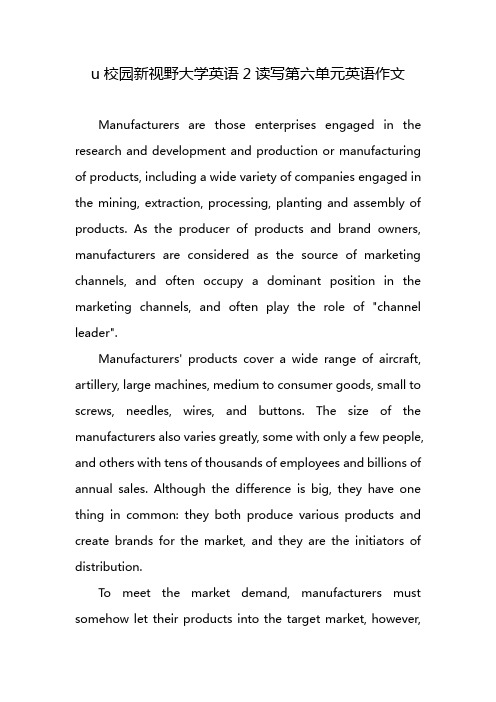
u校园新视野大学英语2读写第六单元英语作文Manufacturers are those enterprises engaged in the research and development and production or manufacturing of products, including a wide variety of companies engaged in the mining, extraction, processing, planting and assembly of products. As the producer of products and brand owners, manufacturers are considered as the source of marketing channels, and often occupy a dominant position in the marketing channels, and often play the role of "channel leader".Manufacturers' products cover a wide range of aircraft, artillery, large machines, medium to consumer goods, small to screws, needles, wires, and buttons. The size of the manufacturers also varies greatly, some with only a few people, and others with tens of thousands of employees and billions of annual sales. Although the difference is big, they have one thing in common: they both produce various products and create brands for the market, and they are the initiators of distribution.To meet the market demand, manufacturers must somehow let their products into the target market, however,due to the lack of corresponding resources (people, money, material), professional skills, or not economic in scale, most manufacturers cannot effectively sell their products directly to all consumers or users in the target market.If the sales are delivered to other channel members, such as wholesalers and retailers, the manufacturer will save a lot of fixed costs that it must invest in the sales. The middleman can operate the products of many other manufacturers at the same time, and gain scale benefits of product sales through functional specialization and sales scale.As can be seen from the above analysis, manufacturers can achieve the best scale in production, but it is often uneconomical to sell directly. Therefore, according to the idea of social division of labor, the manufacturers have objective needs for the services of middlemen, and the dependence on middlemen is inevitable.In conclusion, the main advantage and responsibility of manufacturers is to produce the product and create the brand, and the rest of the distribution work should be left to a professional distribution agency.翻译:制造商是指那些从事产品研发及生产或制造的企业,包括各种各样从事采掘、提取、加工、种植和组装产品的公司。
新视野大学英语第三版读写2u校园参考答案
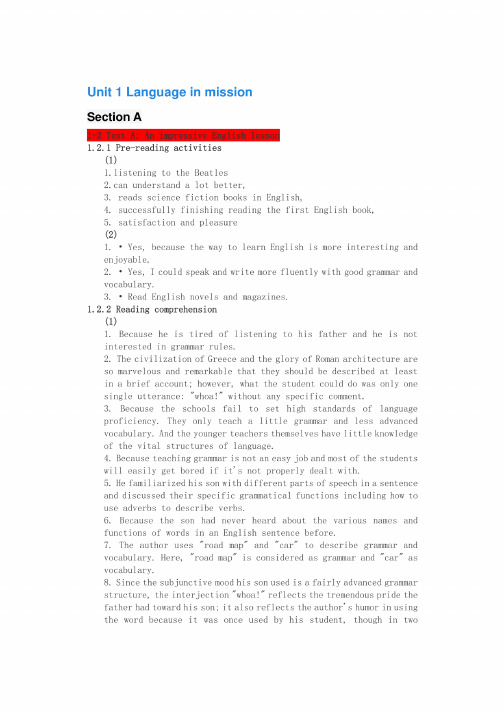
Unit 1 Language in missionSection Acan understand a lot better,reads science fiction books in English,successfully finishing reading the first English book, satisfaction and pleasureat least only one language advanced 1. 2. 1 Pre-reading activities(1)1.listening to the Beatles2.3.4.5.(2)1. • Yes, because the way to learn English is more interesting and enjoyable.2. • Yes, I could speak and write more fluently with good grammar and vocabulary.3. • Read English novels and magazines.1. 2. 2 Reading comprehension(1)1. Because he is tired of listening to his father and he is not interested in grammar rules.2. The civilization of Greece and the glory of Roman architecture are so marvelous and remarkable that they should be described in a brief account ; however, what the student could do was single utterance : 〃whoa!〃 without any specific comment.3. Because the schools fail to set high standards of proficiency. They only teach a little grammar and less vocabulary. And the younger teachers themselves have little knowledge of the vital structures of language.4. Because teaching grammar is not an easy job and most of the students will easily get bored if it's not properly dealt with.5. He familiarized his son with different parts of speech in a sentence and discussed their specific grammatical functions including how to use adverbs to describe verbs.6. Because the son had never heard about the various names and functions of words in an English sentence before.7. The author uses 〃road map ,z and 〃cax〃 to describe grammar and vocabulary. Here, 〃road map ,z is considered as grammar and 〃cax〃 as vocabulary.8. Since the subjunctive mood his son used is a fairly advanced grammar structure, the interjection 〃whoa!〃 reflects the tremendous pride the father had toward his son; it also reflects the author's humor in using the word because it was once used by his student, though in twodifferent situations and with two different feelings.(2)1.•Motivation.2.English grammar helps a lot in the following:3.•Use more communicative ways.4.•Read more English from online sources.5.•Read English newspapers,magazines,and books.1. 3.1Word in use1.condense,2.exceed,3.deficit,4.exposure,5.asset,6.adequate,petent,8.adjusting,9.precisely,10.beneficial1.3.2Word building:Practice(1)1)managerial,2)editorial,3)substance,4)survival,5)tradition,6)margin,7)consistency,8)accuracy,9)efficient,10)recovery,11)ministry,12)assembly(2)I.editorial,2.recovery,3.accuracy,4.substance,5.managerial,6.margin,7.assembly,8.Ministry,9.survival,10.tradition,II.consistency,12.efficient1. 3.4Banked cloze1)obliged,2)tedious,3)beneficial,4)abundant,5)adjusted,6)bulk,7)evidently,8)functions,9)efficiently,10)distress1. 3.5Expressions in use1.feel obliged to,2.be serious about,3.run into,4.distinguish between,5.thrust upon,6.was allergic to,7.get lost,8.be attracted to,9.make sense,10.looked upon as1. 4.1Structured writing:PracticeSome bookworms in my dormitory often spend hours reading their 〃Bible〃,Practical English Grammar,and do a lot of exercises in that book,but I don,t care about it at all.My assumption is since I have never learned Chinese grammar,what's the sense of learning English grammar?In fact,English grammar has always been a big headache to me.English grammar is very complicated because,unlike Chinese, there are many verb tenses.Even stranger than verb tenses,English grammar also contains something very confusing.For example,I don,t remember how many times my middle school teacher tried to〃impose〃the differences between used to and be used to on us.Sometimes he would go on with the explanation for20minutes or so.He even summarized the differences by listing three or four points for us to memorize.However,they could never stay in my head.I don,t remember how many times I got it wrong with the sentences containing used to or be used to on my exams.I was really confused with these two phrases, and I can never get them right.In brief,I'm allergic to learning English grammar.Curiously,I just wonder if the native speakers of English have a microcomputer in their brain to help them utter the two phrases promptly with just a click of their brain mouse!⑴人们普遍认为英语是一种世界语言,经常被许多不以英语为第一语言的国家使用。
新视野大学英语第三版读写教程第二册第六单元课后答案
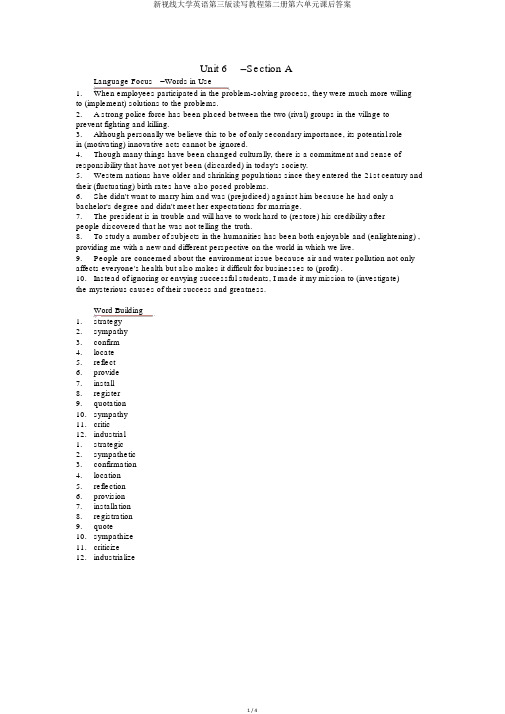
Unit 6–Section ALanguage Focus–Words in Use1.When employees participated in the problem-solving process, they were much more willingto (implement) solutions to the problems.2. A strong police force has been placed between the two (rival) groups in the village toprevent fighting and killing.3.Although personally we believe this to be of only secondary importance, its potential rolein (motivating) innovative acts cannot be ignored.4.Though many things have been changed culturally, there is a commitment and sense of responsibility that have not yet been (discarded) in today's society.5.Western nations have older and shrinking populations since they entered the 21st century and their (fluctuating) birth rates have also posed problems.6.She didn't want to marry him and was (prejudiced) against him because he had only a bachelor's degree and didn't meet her expectations for marriage.7.The president is in trouble and will have to work hard to (restore) his credibility afterpeople discovered that he was not telling the truth.8.To study a number of subjects in the humanities has been both enjoyable and (enlightening) , providing me with a new and different perspective on the world in which we live.9.People are concerned about the environment issue because air and water pollution not only affects everyone's health but also makes it difficult for businesses to (profit) .10.Instead of ignoring or envying successful students, I made it my mission to (investigate)the mysterious causes of their success and greatness.Word Building1.strategy2.sympathy3.confirm4.locate5.reflect6.provide7.install8.register9.quotation10.sympathy11.critic12.industrial1.strategic2.sympathetic3.confirmation4.location5.reflection6.provision7.installation8.registration9.quote10.sympathize11.criticize12.industrialize1.He's usually indifferent to the feelings of other people; he can neither understand nor (sympathize) with my eagerness and anxiety.2.There has been no official (confirmation) that the documents are original, although different sources from the media and the public suggest that they are.3.There's a consensus that the (strategic) defense of a country depends on a powerful airforce and marine force, in addition to advanced arms.4.Total construction time of the shop was about 30 days including the (installation) of the newly-imported machines and the assembly of the various parts.5.To illustrate my point of view, I would like to (quote) from a source that many of us findmore authoritative than the words of a businessman.6.People need to be kind. Therefore, I am not ashamed to be regarded as (sympathetic) to the anxieties of those who are treated harshly in life.7.In business, we often do things inappropriately. For example, we may (criticize) someone's work in front of their co-workers.8.The restaurant has recently moved here because its owners want to provide a convenient (location) for their customers in this area.9.Cultural awareness will help you when you learn the language. After all, language is a(n) (reflection) of the culture from which it developed.10.Students are no longer learning how to (industrialize) agricultural economy; instead, they are learning the digital economy.11.People living in this remote area for generations have harsh living conditions and poor (provision) of housing, food and medicines.12.If you do not get the detailed information required for the school's (registration) , you maylose the opportunity to take the classes you want.Banked ClozeSimplifying is not necessarily about less. It can be about more: more time, more enjoyment, more accomplishment, and more of what (1) (profits) you. If you do a lot of things that don't bring you joy or support your long-term plan, then doing less of that kind of things makes sense because you can't (2) (preserve) everything. The purpose of simplifying is to remove what's not important.To understand what should be (3) (discarded), try to think of activities and things as either assets or obligations. An asset is something that is valuable. Some (4) (corresponding) examples are stocks, bonds, buildings, land, gold, etc., but a little more broadly, an asset is anything that can strengthen and (5) (motivate) you, moving you closer to your goals. However, obligations are debts. An obligation is anything that (6) (weakens) you, moves you farther from your goals, provides negative stress, creates anxiety, and decreases your health. Then how can you (7) (implement) the idea of simplifying? Think about your daily activities and start with just one area. For example,you may begin with (8) (obligations) by making a long list of your daily activities. Your list may (9) (revolve) around such routines as paying bills and planning a birthday party for a friend, etc.Do the activities get you closer to your goals? If not, (10) (modify) the list. Remove what is unnecessary in order to concentrate more on something important in your life.Language Focus–Expressions in Use1.Though he was 80 years old, blind and hardly able to walk, his family (was attached to)him so much that they could hardly bear the thought of his death.2.The support our volunteers provide to the community as well as society cannot (be measured in) purely practical terms, and their continuing contribution is vital.3.Please don't forget the Tourist Guide, which should (come in handy) when you travel to different places in Asia and Europe for the next few weeks.4.These people living in this area are still (clinging to) their traditions which give their life meaning and help them in answering many questions.5.You will (pay a big price) for not learning English; you never know how much you willmiss without being able to speak English.6.If you (are exhausted from) travel and trying to adjust to a new time zone, you may not beready to face the new challenging environment yet.7.The general manager of the company intends to introduce new management courses, and tighter controls will be (imposed on) internal management to raise efficiency.8.Class discussions next week will (revolve around) the importance of love, communication anda close relationship between parents and their children.Translation英译汉Minimalism (极简主义) is about getting rid of excess stuff and keeping only what you need. Minimalist living, in simplest terms, is to live with as less as possible, mentally and physically until you achieve peace of mind. Results that ensue are less stress, more time, and increased happiness. Minimalists like to say that they're living more meaningfully, more deliberately, and that the minimalist lifestyle allows them to focus on what's more important in life: friends, hobbies, travel, experiences. Of course, minimalism doesn't meanthere's anything inherently wrong with owning material possessions. Today's problem seems to be that we tend to givetoo much meaning to our things, often forsaking ( 扔掉 ) our health, our relationships, our passions, our personal growth, and our desire to contribute beyond ourselves. In addition to its application in people's daily life, minimalism also finds application in many creative disciplines, including art, architecture, design, dance, film making, theater, music, fashion, photography and literature.极简主义是指去掉剩余的,仅保存需要的部分。
u校园quiz答案quiz2新视野大学英语(第三版)读写教程2
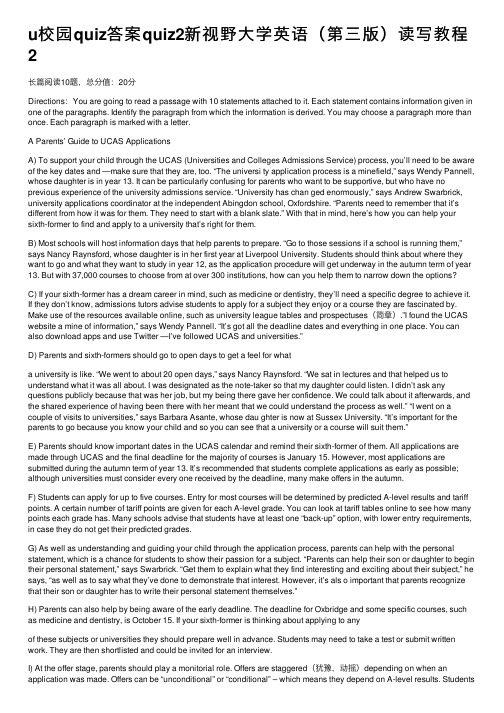
u校园quiz答案quiz2新视野⼤学英语(第三版)读写教程2长篇阅读10题,总分值:20分Directions:You are going to read a passage with 10 statements attached to it. Each statement contains information given in one of the paragraphs. Identify the paragraph from which the information is derived. You may choose a paragraph more than once. Each paragraph is marked with a letter.A Parents’ Guide to UCAS ApplicationsA) To support your child through the UCAS (Universities and Colleges Admissions Service) process, you’ll need to be aware of the key dates and —make sure that they are, too. “The universi ty application process is a minefield,” says Wendy Pannell, whose daughter is in year 13. It can be particularly confusing for parents who want to be supportive, but who have no previous experience of the university admissions service. “University has chan ged enormously,” says Andrew Swarbrick, university applications coordinator at the independent Abingdon school, Oxfordshire. “Parents need to remember that it’s different from how it was for them. They need to start with a blank slate.” With that in mind, here’s how you can help your sixth-former to find and apply to a university that’s right for them.B) Most schools will host information days that help parents to prepare. “Go to those sessions if a school is running them,”says Nancy Raynsford, whose daughter is in her first year at Liverpool University. Students should think about where they want to go and what they want to study in year 12, as the application procedure will get underway in the autumn term of year13. But with 37,000 courses to choose from at over 300 institutions, how can you help them to narrow down the options?C) If your sixth-former has a dream career in mind, such as medicine or dentistry, they’ll need a specific degree to achieve it. If they don’t know, admissions tutors advise students to apply for a subject they enjoy or a course they are fascinated by. Make use of the resources available online, such as university league tables and prospectuses(简章).”I found the UCAS website a mine of information,” says Wendy Pannell. “It’s got all the deadline dates and everything in one place. You can also download apps and use Twitter —I’ve followed UCAS and universities.”D) Parents and sixth-formers should go to open days to get a feel for whata university is like. “We went to about 20 open days,” says Nancy Raynsford. “We sat in lectures and that helped us to understand what it was all about. I was designated as the note-taker so that my daughter could listen. I didn’t ask any questions publicly because that was her job, but my being there gave her confidence. We could talk about it afterwards, and the shared experience of having been there with her meant that we could understand the process as well.” “I went on a couple of visits to universities,” says Barbara Asante, whose dau ghter is now at Sussex University. “It’s important for the parents to go because you know your child and so you can see that a university or a course will suit them.”E) Parents should know important dates in the UCAS calendar and remind their sixth-former of them. All applications are made through UCAS and the final deadline for the majority of courses is January 15. However, most applications are submitted during the autumn term of year 13. It’s recommended that students complete applications as early as possible; although universities must consider every one received by the deadline, many make offers in the autumn.F) Students can apply for up to five courses. Entry for most courses will be determined by predicted A-level results and tariff points. A certain number of tariff points are given for each A-level grade. You can look at tariff tables online to see how many points each grade has. Many schools advise that students have at least one “back-up” option, with lower entry requirements, in case they do not get their predicted grades.G) As well as understanding and guiding your child through the application process, parents can help with the personal statement, which is a chance for students to show their passion for a subject. “Parents can help their son or daughter to begin their personal statement,” says Swarbrick. “Get them to explain what they find interesting and exciting about their subject,” he says, “as well as to say what they’ve done to demonstrate that interest. However, it’s als o important that parents recognize that their son or daughter has to write their personal statement themselves.”H) Parents can also help by being aware of the early deadline. The deadline for Oxbridge and some specific courses, such as medicine and dentistry, is October 15. If your sixth-former is thinking about applying to anyof these subjects or universities they should prepare well in advance. Students may need to take a test or submit written work. They are then shortlisted and could be invited for an interview.I) At the offer stage, parents should play a monitorial role. Offers are staggered(犹豫,动摇)depending on when an application was made. Offers can be “unconditional” or “conditional” – which means they depend on A-level results. Studentshave to decline or accept only when all of their five choices have got back to them. They will then have to respond by a set deadline, given by UCAS. If a student’s first choice is a conditional offer, they can also accept a second insurance choice, which asks for lower grades. “At this stage, parents should ask sixth-formers what the deadline is and when they plan to make their response by, to make sure that they are on top of the procedure. As the whole thing becomes more real, parents could help to organ ize another visit or two so that they get a second impression.”J) If your sixth-former did not get into any of their choices, then they can still find a course through UCAS Extra, which stays open until early July. They can use the course search to find out which courses still have places available and apply through UCAS. Another option is to go through clearing, which matches students with unfilled places on courses. It’s organized by UCAS and opens at 5 p.m. on A-level results day, August 15. It then runs until September. Encourage your child to keep calm, as clearing can be a stressful process. Expect them to be on the phone, contacting universities. Institutions say they prefer students, rather than parents, to call, so it’s best for parents to take a step back and to let their son or daughter speak for themselves.1)If a student is not sure about what subject to learn, he will be advised to apply for the subject he is interested in. C2)If a sixth-former graduate applies for medicine course, he should get to know the deadline for it and prepare for some tests ahead of time. H3)The advantage that parents accompany their children to the open days is that they can give their children confidence and help. D4)Many applicants submit their applications in the autumn of year 13 rather than in the January of year 14. E5)Students have to make a final decision about which university to attend by the deadline given by UCAS. I6)Students are recommended to choose at least one course with lower entry requirements. F7)Some parents, especially those who have never gone through university admission service, feel troubled and worried about the process of their kid’s university application. A8)Parents are suggested to go to the colleges on their information days to get well prepared to help their children. B9)Students who fail to be admitted by their ideal universities can still find vacancy in other universities before early July through UCAS Extra. J10)When writing personal statement, students should explain their interests in the chosen subject. G参考答案:1) C 2) H 3) D 4) E 5) I6) F 7) A 8) B 9) J 10) G阅读理解15题,总分值:30分Directions:Read the following passages carefully. Each passage is followed by some questions or unfinished sentences. For each of them there are four choices marked A, B, C, and D. Choose the best answer to each question.Worldwide, 40 million new passenger cars are built every year. A recent survey estimates that the number of cars will triple over the next 20 years. Most of this growth will take place in China. In comparison, the United States has been completely transformed by cars.Cars did not become necessities for families in the United States until after World War II. Prior to that time, cars were seen mainly as toys for the rich. By the end of the war, however, people were tired of saving their money. They were ready to have some fun. Unlike Europe and Japan, whose industries had been wiped out by World War II, factories in the United States could quickly be changed from production of wartime items to mass production of such luxury items as cars.As cars grew in popularity in the United States, there were also changes in lifestyle. Farmers who were once isolated from society by rural life now took weekend trips into the city. Also, workers in the cities no longer needed to live in inner-city housing in order to keep their jobs at nearby factories. Those who made enough money moved out of the cities and into the suburbs. Now that each family had its own car, going to work from the suburbs became a common practice.Cars not only changed the way people lived, but also changed the way they thought. Traditionally, because young people spent most of their time outside school in and around the home, the strongest role models for teenagers were their parents. However, once they had access to their own cars, teens began spending more time out with friends. Therefore, they became less likely to follow the behavior of their parents and more likely to follow their friends’.One thing producers paid little attention to, however, was safety. It wasn’t until the mid-1960s that consumers began to demand that all car companies include at least a few common safety features in new cars. These new standards eventually led to safety features such as seat belts, air bags, anti-lock brakes, and automatic door locks.11)Why cars didn’t sell as well in Europe as in the United Stat es?A. Because people weren’t interested in cars.B. Because fewerfactories were able to make cars. C. Because people couldn’t afford cars.D. Because fewer people lived on farms.12)According to the passage, what was the greatest benefit of cars to American life?A. They provided people with more freedom to travel.B. Theyencouraged people to drive cars to and from work. C. They led to thedevelopment of drive-in movies and drive-through restaurants. D. Theyallowed teenagers to spend more time with their friends.13)The main point of Paragraph 4 is that cars ________.A. caused families to grow closerB. changed the thoughts ofteenagers C. changed the lives of adults D. made everyday life easyand fun14)What caused the change of the car safety features?A. Many car accidents during 1960s.B. The regulations by thegovernment. C. The standards by the car company. D. Customerswho would purchase cars.15)What’s the main theme of the passage?A. The US has most of the cars in the world.B. China will soonsurpass the US in the car market. C. Americans’ lives have changed a lotwith the car industry. D. Europeans were living in poverty after World WarII.参考答案:11) C 12) A 13) B 14) D 15) CWhat do Leonardo da Vinci (达芬奇) and Albert Einstein have in common? They were both left-handed, along with other famous people including Pablo Picasso (毕加索). In fact, an estimated 11 percent of Americans and Europeans are left-handed.Most people around the world are right-handed. This fact also seems to have held true throughout history. In 1977, scientists studied works of art made at various time in history starting with cave drawings from 15,000 B.C. and ending with paintings from the 1950s. Most of the people shown in these works of art are right-handed, so scientists guessed that right-handedness has always been common.Many researchers claim to have found relationships between left-handedness and various physical and mental characteristics, such as blond hair, blue eyes, vegetarianism, and sleep difficulties. Other studies have found a higher-than-normal level of left-handed people in certain occupations, including professional baseball and tennis players, architects, lawyers, as well as prisoners. However, some of these connections are very weak, and others haven’t been proven.What makes a person become right-handed rather than left-handed? As yet, no one really knows for sure. One simple idea suggests that people normally get right-handedness from their parents. Studies have found that two right-handed parentshave only 9.5 percent chance of having a left-handed child, while two left-handed parents have a 26 percent chance of having a left-handed child. Another common theory is that left-handed people suffer mild brain damage during their birth. Whatever the reasons behind it, people’s attitudes toward left-handedness have changed a lot over the years. Statistics show that although 13 percent of young people (10-12 years old) are left-handed, only 6 percent of the elderly are left-handed. Left-handed children used to be punished until they began using their right hand like other children, but today people who are left-handed are no longer looked down upon nor are they considered abnormal.For most people today either case is perfectly acceptable. There are even a number of shops now that specialize in selling products designed for left-handed people, such as left-handed scissors, can openers, guitars, and even a left-handed camera. Don’t you think it’s wond erful?16)From studying works of art, scientists have learned that ________.A. left-handed people are better artistsB. most artists are left-handedC. most people in history were right-handedD. cave drawings weredrawn using both hands17)What is talking about in the Paragraph 3?A. People with certain characteristics are better at certain jobs.B. Left-handed people are better at some jobs.C. Left-handedness islinked with certain characters and occupations. D. There are somereasons why people are left-handed.18)Why is a person right-handed?A. It is caused by the person’s parents.B. It is due to the environmentthe person lives in. C. It is suffered a mild brain damage at birth. D. Itis not sure about specific reasons yet.19)What can be assumed about the children of two left-handed parents?A. Many of them are left-handed.B. Most of them are right-handed.C. Most of them use both hands equally.D. Very few of them are left-handed.20)Left-handed children ________.A. are usually looked down uponB. are exceptionally talented likeEinstein C. are thought of as abnormal D. were often forced to become right-handed参考答案:16) C 17) C 18) D 19) A 20) DWhat is the value of the humanities? Why should we study the humanities given the current economic recession? In this new era of continuous unemployment slides and shrinking university funds, questions about the importance of the humanities in a complex and technologically demanding world have taken on new urgency.While the humanities may not seem as important as engineering, chemistry, or any of the other “hard” sciences, it still plays a significant role in the world. There is a great misunderstanding of what the humanities are and what they can do. People often assume that the humanities are just about reading the great literary and philosophical works and understanding the question of what living is for.I would argue that humanities – at least from a Cultural Studies perspective –is much more than reading the classic works and speculating about the meaning of life. In Cultural Studies, we apply theory to practice. Thinking and acting outside of the ivory tower, Cultural Studies attempts to produce research that engages with the public. As a cultural researcher, I am constantly asking myself the “So what?” question. Why does this topic matter? Why should people care?This continuous self-questioning helps bridge the gap between theory and practice. While I am learning for the sake of learning, I believe scholars have the responsibility to think about the ways in which their research relates to the larger picture. What is the point of research if it doesn’t affect the way people think about and act in the world?One thing I think Cultural Studies does effectively is rethinking the way we have traditionally thought about things. In Cultural Studies, few things –if anything –are taken for granted. Our research is largely driven by thequestion of what it means to be human. Through critical and creative engagement, we attempt to speculate on a question in a way that inspires people to imagine what might be instead of what is.This critical and creative engagement is especially important given the worsening state of the economy and the need for creative ways of being in the world.21)Why has the question of studying the humanities taken on new urgency?A. More people have realized its importance.B. It has become amore interesting topic. C. It’s driven by the current economic downturn.D. It’s compelled by today’s complex world.22)According to the author, what’s the assumption of the general public?A. “Hard” sciences are more important than the humanities.B. Mostpeople don’t know who they are and what they can do. C. People don’treally understand the meaning of life. D. The humanities are only to do with literatures and philosophies.23)What does Paragraph 3 mainly talk about?A. It asks “So what?” question.B. It argues to support the humanities.C. It produces research to get involved with people.D. It tries to think and act outside of the ivory tower.24)What is the author’s point in Paragraph 4?A. Do the research that will impact on people.B. Bridge the gapbetween theory and practice. C. Learn things for the sake of learning.D. Lake the responsibility to do research.25)According to the author, “rethinking” means ________.A. to think what it means to be humanB. to believe nothing is certainC. to question the traditional way of thinkingD. to use a unique way of thinking参考答案:21) C 22) D 23) B 24) A 25) C完型填空20题,总分值:30分Directions: There are some blanks in the following passage. For each blank there are four choices marked A, B, C and D. You should choose the ONE that best fits into the passage.learning history. 37) (Given) the huge cost of attending university and the current 38) shrinking job market, should we still major in history? Sure, we may have different answers, but 39) whatever we want to do in the future, most of us have to 40) (adjust) ourselves to the worsening economy today. Nowadays, studying history is more likely a 41)(barrier) to finding a sensible job.Ambitious students have the strong 42) (motive) to help people and save the world after college. But today’s education is market- 43) oriented , and the sole purpose of education is to make money. Not only are there not 44) (sufficient) jobs in the current struggling market, but it also has become 45) evident that there will never be enough promising jobs in the future, not to mention jobs for students of history.26)A. reversesB. repeatsC. doublesD. asserts27)A. partialB. practicalC. criticalD. cynical28)A. speculateB. associateC. estimateD. illustrate29)A. aloneB. lonelyC. solelyD. hardly30)A. deficitB. effectC. defectD. prospect31)A. accumulatedB. calculatedC. speculatedD. related32)A. eliminateB. have eliminatedC. have been eliminatedD. be eliminated33)A. cynicalB. criticalC. typicalD. logical34)A. UnfortunatelyB. UncertainlyC. IncrediblyD. Unbelievably35)A. In allB. In additionC. In briefD. In result36)A. chargedB. absorbedC. obligedD. committed37)A. ConditionedB. TakenC. ConsideredD. Given38)A. shrinkingB. quiveringC. tremblingD. shaking39)B. whereverC. whateverD. whichever40)A. adoptB. adjustC. affectD. effect41)A. barrierB. carrierC. boundaryD. frontier42)A. purposeB. motionC. decisionD. motive43)A. advertisedB. intendedC. oriented44)A. satisfactoryB. sufficientC. efficientD. proficient45)A. evidentB. confidentC. distinctiveD. distinguished参考答案:26) B 27) D 28) A 29) C 30) C 31) A 32) C 33) D 34)A 35)B 36)C 37)D 38) A 39) C 40) B 41) A 42) D43) C 44) B 45) A选词填空(15选10)10题,总分值:20分Directions:Fill in the blanks in the following passage by selecting suitable words from the word bank. Each word can be used only once.Many people like to save books. If you walk into their home, you are 46) (liable) to see anywhere from a single bookshelf to a whole library full of all kinds of books. They have 47) (accumulated) such a wealth of books that the shelves in their study rooms reach up to the ceilings. The 48) (spectacular) book collections they keep on the shelves are dusted and lined up neatly. There are two important reasons why people save books.One reason people save their books is to use them as reference materials. People whose job includes studying a lot of textbooks might feel 49) (compelled) to save some of those books for future reference. Those interested in electronic equipment keep their books to 50) (speculate) about the mystery of computer technology and the like. Many families keep encyclopedias (百科全书) for their children to 51) boost their knowledge.Another reason people save books is to make a good impression. Some think that a library full of the books of the 52) humanities , such as literatures and the books about art and history makes them look 53) knowledgeable . Some people have never 54) (bothered) to read those books. Also, some people like to show to visitors their wide 55) (scope) of tastes and interests. In fact, it’s just a good feeling they want to have.B. speculateC. spanD. scopeE. availableF. compelledG. botheredH. accumulatedI. prospectJ. boostK. humanitiesL. liableM. knowledgeableN. expelledO. stimulated参考答案:46) liable 47) accumulated 48) spectacular 49) compelled 50) spe culate 51) boost 52) humanities 53) knowledgeable 54) bothered 55) scope。
《U校园》新视野大学英语视听说教程2第三版unit6答案
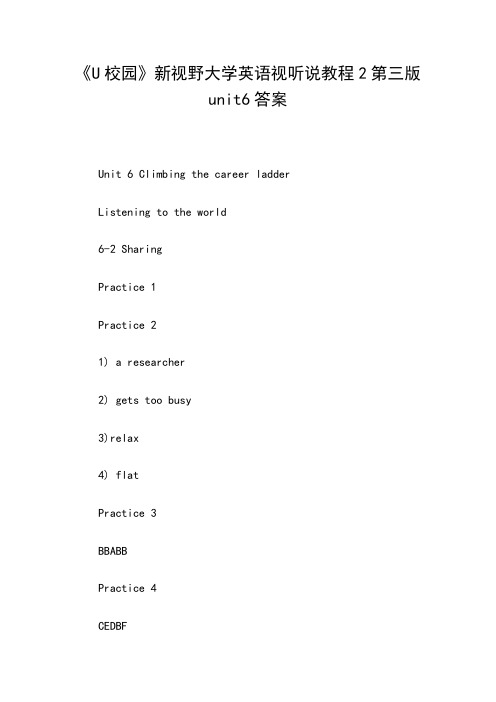
《U校园》新视野大学英语视听说教程2第三版unit6答案Unit 6 Climbing the career ladderListening to the world6-2 SharingPractice 1Practice 21) a researcher2) gets too busy3)relax4) flatPractice 3BBABBPractice 4CEDBFPractice 5参考:1. The worst thing about her job is that it can get very stressful.2. Seeing that people who are very poor and very sad don't have much opportunity and can do lttle about it hurts him a lot.3. The worst thing about his job is the (long) hours he works.4. He never knows what he's gonna be doing from one day to the next, so sometimes it's hard to make plans.5. What he dislikes about his job is being away from his family.6.He thinks spending a lot of time outside of the UK has its disadvantages.6-3 ListeningUse the skills 1Use the skills 21)a free bus ride2) a dentist3) watch films4) Lunch5) a cheap6) take your dog7)a surprise holiday8) free coffee9) bring their children10) a party11) free drinks12) go fishing13) all the fishThink and spcak 16-4 ViewingView it 11) traveling to work2) live abroad3) cheap houses4) an online map company5) 38 pounds / thirty-eight pounds6) quality of life7) the trafficThink and speak 1Speaking for communication6-6 Rolc-playingNote them down1ABBBNote them down 2I. (1) like2. (2) can't stand / can not stand3. (3) absolutely love4. (4) don't like/ do not like(5) prefer5. (6) don't mind / do not mind6. (7) keen on7. (8) hate8. (9) not very keen on(10) want to be6-7 PresentingGet ideas 12. (3) personal(2) faces2.(3) personal(4) special message3. (5)at home4. (6) beautiful websiteGet ideas 2c d a e bOrganize ideas 1Present ideas 1More practice in listening6-8 More practice in listening Conversations 1BDCCConversations 2ADBBPassages 1BBADPassages 21) evaluate2)compensation3) negotiating4) confirm5) schedule6) circumstances7)turn down8) start over9) work out10) informed News 1B CNews 2C AUnit test6-10 Unit test短对话5题1) They are too worried about their appearance.2) Give a speech.3) He is afraid of flying.4) She performed poorly and is unlikely to get the job.5) It has both advantages and disadvantages.长对话5题6) Reading resumes.7) Because the resumes are too good.8) Mr. Phil Langdon.9) Miss Raina Aziz.10) The man thinks that some students today take academics too seriously.短文理解5题11) They work longer hours today than workers did in 1979.12) He observed the banker hard at work.13) The banker spent 80 percent of his time doing busy work.14) It is not always positive,15) According to the working time and job performance.复合式听写10题16) opportunities17) practical18) define19) compassion20) focusing on21) significance22) think big23) plays a huge role24) attend25) Contented。
大学新视野英语读写2答案。Unit 6-10
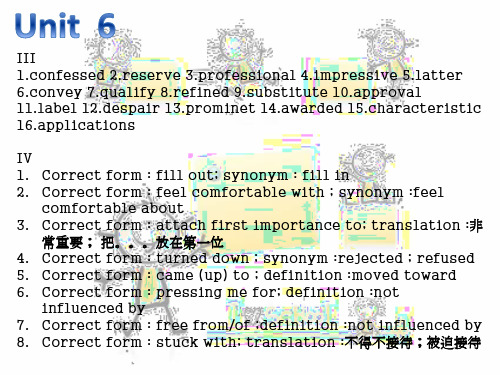
VII 1.unreasonable 2.unfolded 3.uncertain 4.uncovered 5.ungrateful 6.unloading 7.unlimited 8.undid VIII 1. so 2. so 3. so 4. so 5. so
is air to man is the eagle of all birds is beer to the British is tea to the Chinese do the English love their beer
IX 1. While waiting at the doctor’s , I read an entire short story. 2. After using the brush , put it in its proper place. 3. Before being in the army , he was an engineer. 4. I deliberately didn’t read the book before going th see the film. 5. When buying a new car, it is best to seek expert advice.
9. Correct form : for better or worse ; definition :whether the result is good or bad 10.Correct form : took charge of ; synonym : took responsibility for 11.Correct form : guilty of ;definition : having committed some crime 12.Correct form : ill at ease ; definition :not relaxed ; uncomfortable 13.Correct form : project…on/upon; definition : imagine someone else is having the same feelings as you 14.Correct form : convey to ; synonym : make it known to V 1.M 2.K 3.L 4.F 5.I 6.C 7.H 8.O 9.E 10.B VI 1.impatient 2.irresponsible 3.inconsistent 4.illegal 5.inappropriate 6.incapable 7.irregular 8.impolite 9.incorrect 10.indefinite
《U校园》新视野大学英语视听说教程2第三版unit6答案

《U校园》新视野大学英语视听说教程2第三版unit6答案Unit 6 Climbing the career ladderListening to the world6-2 SharingPractice 1Practice 21) a researcher2) gets too busy3)relax4) flatPractice 3BBABBPractice 4CEDBFPractice 5参考:1. The worst thing about her job is that it can get very stressful.2. Seeing that people who are very poor and very sad don't have much opportunity and can do lttle about it hurts him a lot.3. The worst thing about his job is the (long) hours he works.4. He never knows what he's gonna be doing from one day to the next, so sometimes it's hard to make plans.5. What he dislikes about his job is being away from his family.6.He thinks spending a lot of time outside of the UK has its disadvantages.6-3 ListeningUse the skills 1Use the skills 21)a free bus ride2) a dentist3) watch films4) Lunch5) a cheap6) take your dog7)a surprise holiday8) free coffee9) bring their children10) a party11) free drinks12) go fishing13) all the fishThink and spcak 16-4 ViewingView it 11) traveling to work2) live abroad3) cheap houses4) an online map company5) 38 pounds / thirty-eight pounds6) quality of life7) the trafficThink and speak 1Speaking for communication6-6 Rolc-playingNote them down1ABBBNote them down 2I. (1) like2. (2) can't stand / can not stand3. (3) absolutely love4. (4) don't like/ do not like(5) prefer5. (6) don't mind / do not mind6. (7) keen on7. (8) hate8. (9) not very keen on(10) want to be6-7 PresentingGet ideas 12. (3) personal(2) faces2.(3) personal(4) special message3. (5)at home4. (6) beautiful websiteGet ideas 2c d a e bOrganize ideas 1Present ideas 1More practice in listening6-8 More practice in listening Conversations 1BDCCConversations 2ADBBPassages 1BBADPassages 21) evaluate2)compensation3) negotiating4) confirm5) schedule6) circumstances7)turn down8) start over9) work out10) informed News 1B CNews 2C AUnit test6-10 Unit test短对话5题1) They are too worried about their appearance.2) Give a speech.3) He is afraid of flying.4) She performed poorly and is unlikely to get the job.5) It has both advantages and disadvantages.长对话5题6) Reading resumes.7) Because the resumes are too good.8) Mr. Phil Langdon.9) Miss Raina Aziz.10) The man thinks that some students today take academics too seriously.短文理解5题11) They work longer hours today than workers did in 1979.12) He observed the banker hard at work.13) The banker spent 80 percent of his time doing busy work.14) It is not always positive,15) According to the working time and job performance.复合式听写10题16) opportunities17) practical18) define19) compassion20) focusing on21) significance22) think big23) plays a huge role24) attend25) Contented。
